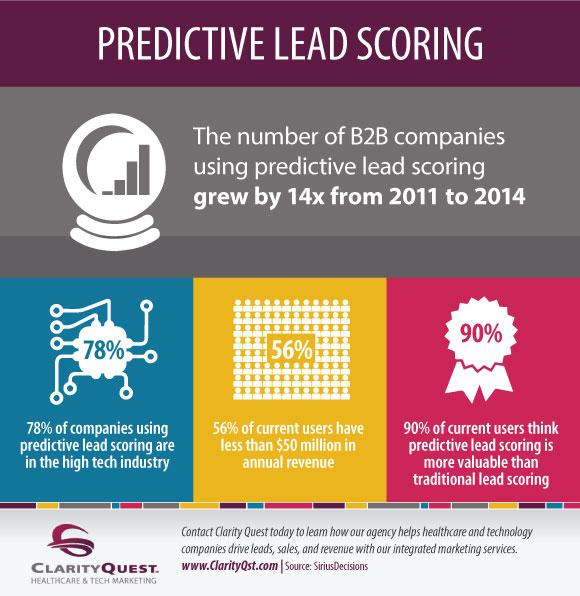Predictive lead scoring is one of the hottest new areas in marketing, and many marketing automation companies are offering it as a new feature. If you haven’t heard of predictive lead scoring yet, you will soon enough. HubSpot, a leader in marketing automation, announced their predictive lead scoring tool in September 2015. Other marketing automation vendors will surely follow suit.
How is Predictive Lead Scoring Different from Traditional Lead Scoring?
Anyone running a mature marketing automation campaign is familiar with traditional lead scoring: manually assigning numerical values to leads based on the demographics and behaviors marketers believe qualify a lead as sales-ready.
The goal of predictive lead scoring is the same: to identify high-quality leads that are ready to pass on to the sales team (and to identify leads that need further nurturing). But instead of assigning arbitrary scores based on marketing’s assumptions of the data that is tied to conversion likelihood, predictive lead scoring uses a more scientific approach.
How Predictive Lead Scoring Works
Predictive lead scoring applies mathematical modeling to define qualified leads. Predictive lead scoring tools match the information and behaviors of previously converted leads to those in your database with the same qualities to determine which leads are most likely to convert.
Predictive lead scoring tools automatically identify qualified leads based on factors such as:
- Information provided by leads
- Behavioral data
- Third-party information
- Social data
- Demographics such as company size or location
- Social engagement
- Email engagement
Why You Should Consider Predictive Lead Scoring
1. Align Sales and Marketing
Data-driven lead scoring removes sales’ and marketing’s assumptions from the process to produce an objective list of qualified, sales-ready leads based on actual behavior and key demographics.
With more accurate and trusted lead scoring results, the sales team is more likely to trust marketing’s recommendations, making the lead hand-off process much smoother and more successful. Sales is more likely to follow up with leads they know have a greater potential to convert.
When trust and a strong relationship are built between sales and marketing, opportunities can be matched to the right sales rep at the right time to increase the chance of success.
2. Nurture Leads Appropriately
By identifying which leads are unlikely to convert, marketers know which prospects need to be nurtured before they are sales-ready. Predictive lead scoring can help marketers determine how much and what type of nurturing each lead requires so they can be funneled into the proper nurture campaign and receive the appropriate content.
3. Refine Your Personas
Using behavior- and data-based insights, predictive lead scoring tools can predict a lead’s likelihood to convert, a relative timeframe for the conversion, and, based on historical customer data, the type of customer a lead may turn out to be (think lifetime value).
You can use this knowledge to your advantage! Once you have detailed information about your actual customers, you can use the insights to develop more accurate, detailed target personas. With personas that closely resemble your qualified leads and customers, your future content and campaigns will be more relevant and targeted to people who are likely to convert.
4. Create Engaging Content
Once you refine your target personas, you can begin creating content to fit their needs and predicted behaviors. Your new content is more likely to resonate with your target audience because it is targeted specifically to people most likely to become your customers.
Because buyer needs and behaviors change over time, you can repeat this refinement process to continually develop your personas, content, and campaigns.
 Is Predictive Lead Scoring Right for Your Company?
Is Predictive Lead Scoring Right for Your Company?
Predictive lead scoring is a great tool for companies or agencies that:
- Are established marketing automation users and have a good amount of data
- Are well-versed in traditional lead scoring
- Have a good understanding of what qualified leads look like
- Have tightly aligned marketing and sales teams
- Have sales teams who actually follow up with marketing leads
Not a Hubspot User?
If you don’t use HubSpot for marketing automation, consider these third-party predictive lead scoring vendors:
- 6Sense
- Fliptop
- Infer
- Lattice
- Leadspace
- Mintigo
- Salesfusion
Do you have questions about lead scoring or marketing automation? Contact Clarity Quest Marketing online or call 877-887-7611 for a free consultation.

 Is Predictive Lead Scoring Right for Your Company?
Is Predictive Lead Scoring Right for Your Company?
